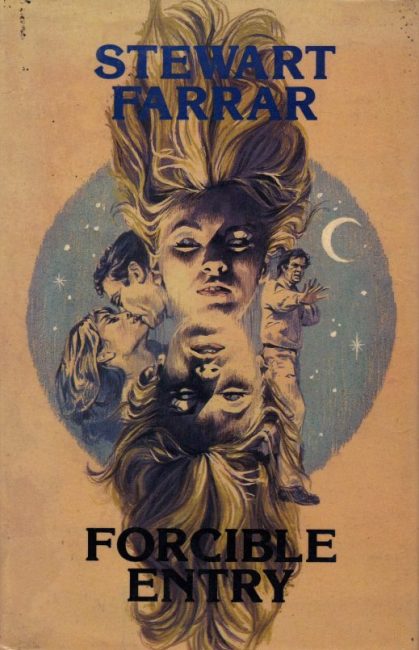 By STEWART FARRAR (Robert Hale Limited; 1986)
By STEWART FARRAR (Robert Hale Limited; 1986)
The idea of transcendental gender swapping certainly isn’t unique, and narrative-wise FORCIBLE ENTRY, about a dying man inhabiting the body of a young woman, isn’t especially noteworthy (with a core concept nearly identical to that of an earlier novel, Pat Winter’s DRIVER). What makes it a standout is the rigorous intelligence and curiosity the author packs into his story, which is as thorough and complex an exploration of sexual identity as any you’ll find.
England’s late Stewart Farrar was quite famous in his day as a practicing Wiccan, and the fact that he actually believed in the occultism depicted in these pages lends the book an authority it wouldn’t otherwise possess. One of its main pleasures is the author’s resolutely clear and logically worked out depiction of the supernatural and its properties.
The situation is this: Matthew, a dying middle-aged man, and Sheila, a vibrant young woman, become telepathically linked at a parapsychology institute where Sheila works and Matthew is a volunteer subject. These two psychically gifted people form a bond on the astral plane, which Matthew, being a sociopathic scumbag, exploits in order to take over Sheila’s body just as his own expires.
The core of the novel consists of Matthew’s attempts at adjusting to life in the body of a woman, and Farrar explores the resulting gender dysphoria with the same rigor he does the occult elements. Yes, this exploration encompasses thorny issues like female sexuality—which, as Matthew learns, is quite different from that of a man—and Sheila’s staunchly heterosexual orientation, which Matthew gradually comes to share. This turns out to be a problem, though, as Sheila’s essence, which was left in limbo after Matthew took over her body, longs to return, and the body, we learn, is especially vulnerable to psychic attacks during sex. Eventually Sheila’s boyfriend Patrick figures out what’s going on and gets in touch with a coven of friendly wiccans, who together with the spirit of a deceased Jesuit priest launch a psychic attack against Matthew.
The passages involving the wiccans (which serve as a mini-advertisement for the author’s beliefs) are among the books weakest, with their climactic take-down of Matthew pulled off far too easily. Another problem is a go-nowhere subplot involving a shadowy organization called Third Eye that’s looking to infiltrate the parapsychology institute where Sheila is employed, which ultimately does nothing but distract from the main story.
Thankfully, the Sheila-Matthew body invasion drama is what ultimately lingers. It helps, of course, that Matthew is a well-rounded, complicated character whose resourcefulness nearly matches his villainy. His attempts at living life in a stolen body make for fascinating and absorbing reading, as we, despite our better nature, are made fully complicit in his vileness.
